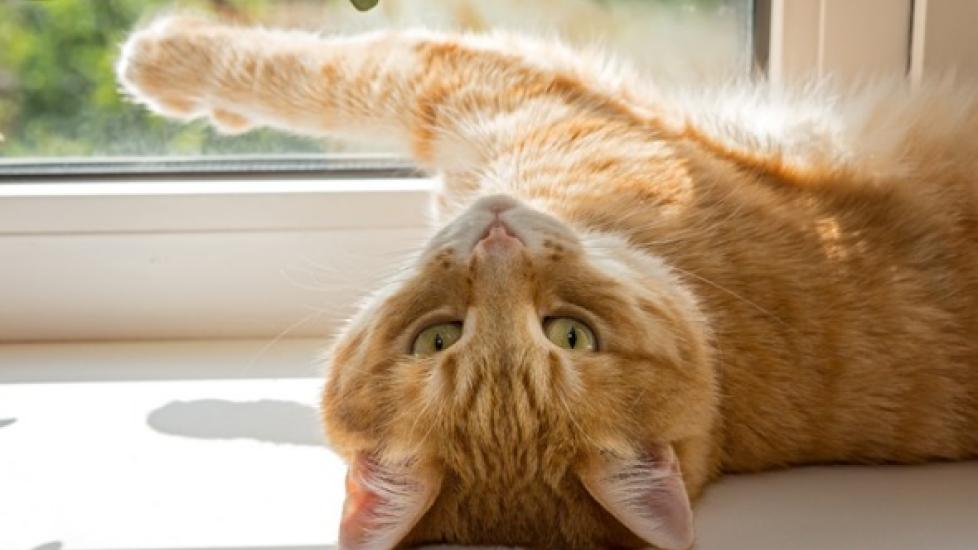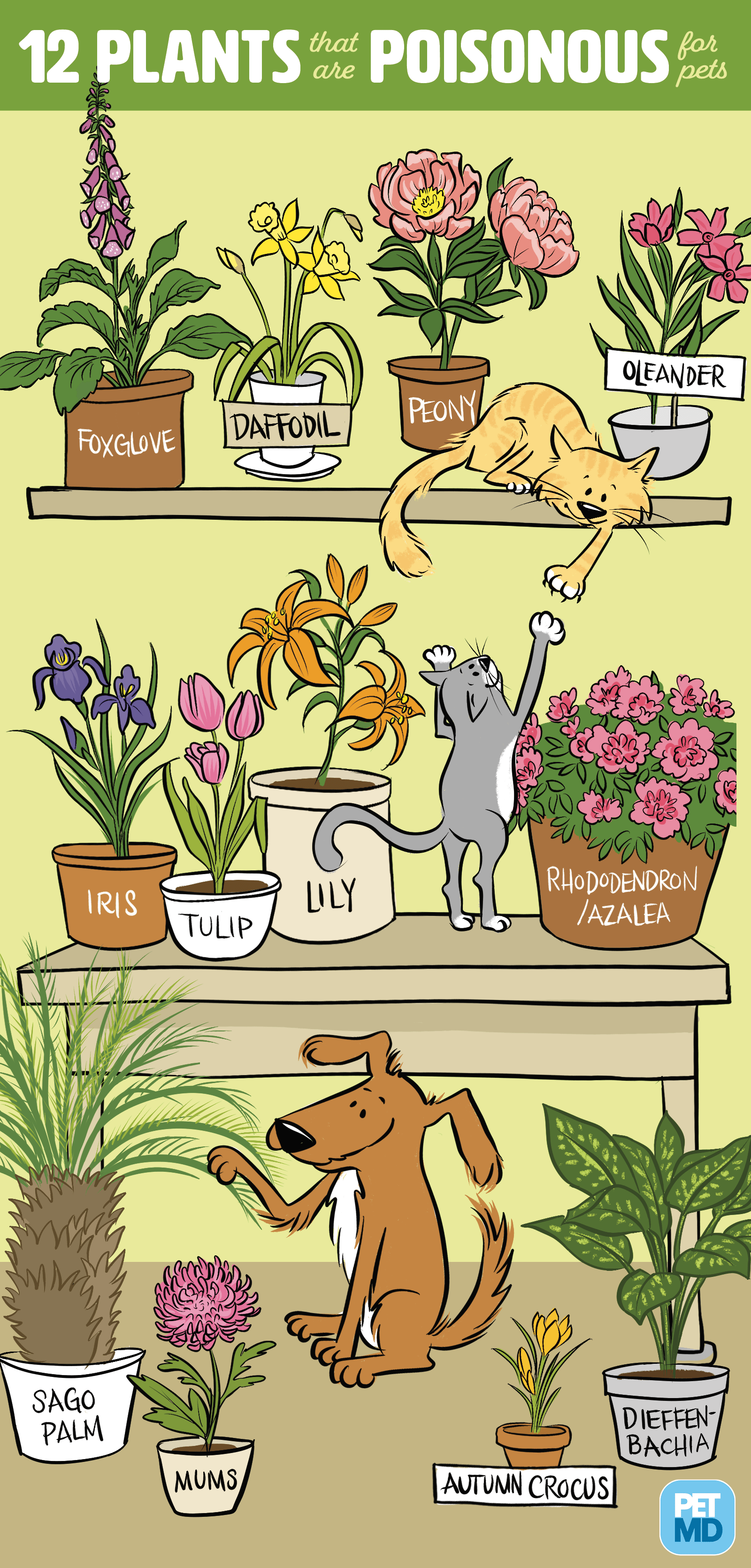Poisonous Plants for Cats
Cats will chew on plants—and because they love to climb and explore, it can be difficult to keep plants out of your curious cat's reach.
If you want to keep plants in your house, or if you let your cat out into your yard, you need to be able to accurately identify plants and flowers that are poisonous to cats. When in doubt, it is safest to remove a questionable plant from your home.
Common Plants and Flowers That Are Poisonous to Cats
Many toxic plants are irritants: they cause localized inflammation of the skin, mouth, stomach, etc. Other plants may have a systemic effect and damage or alter the function of a cat’s organs, like the kidney or heart.
Some common plants that are toxic to cats include:
- Amaryllis (Amaryllis spp.)
- Autumn Crocus (Colchicum autumnale)
- Azaleas and Rhododendrons (Rhododendron spp.)
- Castor Bean (Ricinus communis)
- Chrysanthemum, Daisy, Mum (Chrysanthemum spp.)
- Cyclamen (Cyclamen spp.)
- Daffodils, Narcissus (Narcissus spp.)
- Dieffenbachia (Dieffenbachia spp.)
- English Ivy (Hedera helix)
- Hyacinth (Hyacintus orientalis)
- Kalanchoe (Kalanchoe spp.)
- Lily (Lilium sp.)
- Lily of the Valley (Convallaria majalis)
- Marijuana (Cannabis sativa)
- Oleander (Nerium oleander)
- Peace Lily (Spathiphyllum sp.)
- Pothos, Devil’s Ivy (Epipremnum aureum)
- Sago Palm (Cycas revoluta)
- Spanish Thyme (Coleus ampoinicus)
- Tulip (Tulipa spp.)
- Yew (Taxus spp.)
You can visit the Pet Poison Helpline to see the Top 10 Plants Poisonous to Pets, or the ASPCA for their extensive list of Toxic and Non-Toxic Plants.
Which Parts of the Plant Are Toxic to Cats?
If a plant is poisonous to cats, assume that all parts of the plant are poisonous, even though some parts of the plant may have higher concentrations of the toxin than others.
Toxic doses can vary widely from plant to plant. In some cases, ingesting a small amount can have devastating results, while for other plants, cats may need to be exposed to relatively large amounts of other plants before symptoms develop.
Symptoms to Watch For
Since many plants are irritants, most symptoms seen will be the result of irritation or inflammation, such as redness, swelling or itchiness of the eyes, skin or mouth.
When deeper parts of the gastrointestinal tract, like the stomach and intestines, become irritated, vomiting and diarrhea are likely.
If the toxin directly affects a particular organ, the symptoms seen will primarily be related to that organ. For example:
- Difficulty breathing (if the airways are affected)
- Drooling or difficulty swallowing (if the mouth, throat or esophagus is affected)
- Vomiting (if the stomach or small intestines are affected)
- Diarrhea (if the small intestines or colon are affected)
- Excessive drinking and urinating (if the kidneys are affected)
- Fast, slow, or irregular heart beat and weakness (if the heart is affected)
Immediate Care
If you see your cat eating a plant and you are uncertain if it is poisonous, or if you even suspect that your cat ate a toxic plant, do the following before you take him to your veterinarian:
-
Remove any plant material from your cat’s hair, skin and mouth if you can do so safely.
-
Keep your cat confined in a safe environment for close monitoring.
-
Call the Pet Poison Helpline at 1-855-764-7661 or Animal Poison Control at 1-888-426-4435.
Identifying the plant is very important for determining treatment. If you are unsure of the name of the poisonous plant that your cat was exposed to, bring a sample of the plant or plant material with you to the veterinary office, including pieces of plant found in vomit.
Diagnosis
The best diagnosis is made by identifying the plant. Your veterinarian will give your cat a physical exam and order blood tests as necessary to determine your cat's overall health.
These tests are especially necessary if the identity of the poisonous plant is unknown, or if the identified plant is known to target internal organs.
Treatment
Your veterinarian may give your cat medications to encourage vomiting and/or activated charcoal to absorb any of the toxin that may be in the gut. Your vet may also administer medication like sucralfate, which protects the damaged areas of the stomach.
Supportive care, such as intravenous fluids, anti-nausea drugs, pain medicine for cats, and anti-inflammatory medication will be used as needed. Other treatments may be required based on the toxin involved and the cat’s condition.
Our vet team is here for all the new pet how-to’s and what if's.
Living and Management
Some poisonous plant ingestions can be fatal for cats, particularly if treatment is delayed. Other plants may cause enough damage that prolonged aftercare in the form of medication or a special diet is needed.
Be sure to follow your veterinarian’s instructions and ask any questions you might have.
Take whatever steps you can to protect your cat from exposure to poisonous plants. This includes removing such plants from your home and keeping your cat indoors, or closely supervising any outdoor activities.

